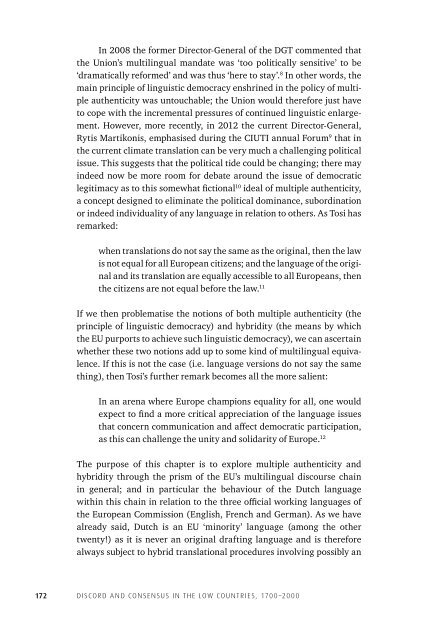Discord Consensus
7aze300jFJo
7aze300jFJo
Create successful ePaper yourself
Turn your PDF publications into a flip-book with our unique Google optimized e-Paper software.
In 2008 the former Director-General of the DGT commented that<br />
the Union’s multilingual mandate was ‘too politically sensitive’ to be<br />
‘dramatically reformed’ and was thus ‘here to stay’. 8 In other words, the<br />
main principle of linguistic democracy enshrined in the policy of multiple<br />
authenticity was untouchable; the Union would therefore just have<br />
to cope with the incremental pressures of continued linguistic enlargement.<br />
However, more recently, in 2012 the current Director-General,<br />
Rytis Martikonis, emphasised during the CIUTI annual Forum 9 that in<br />
the current climate translation can be very much a challenging political<br />
issue. This suggests that the political tide could be changing; there may<br />
indeed now be more room for debate around the issue of democratic<br />
legitimacy as to this somewhat fictional 10 ideal of multiple authenticity,<br />
a concept designed to eliminate the political dominance, subordination<br />
or indeed individuality of any language in relation to others. As Tosi has<br />
remarked:<br />
when translations do not say the same as the original, then the law<br />
is not equal for all European citizens; and the language of the original<br />
and its translation are equally accessible to all Europeans, then<br />
the citizens are not equal before the law. 11<br />
If we then problematise the notions of both multiple authenticity (the<br />
principle of linguistic democracy) and hybridity (the means by which<br />
the EU purports to achieve such linguistic democracy), we can ascertain<br />
whether these two notions add up to some kind of multilingual equivalence.<br />
If this is not the case (i.e. language versions do not say the same<br />
thing), then Tosi’s further remark becomes all the more salient:<br />
In an arena where Europe champions equality for all, one would<br />
expect to find a more critical appreciation of the language issues<br />
that concern communication and affect democratic participation,<br />
as this can challenge the unity and solidarity of Europe. 12<br />
The purpose of this chapter is to explore multiple authenticity and<br />
hybridity through the prism of the EU’s multilingual discourse chain<br />
in general; and in particular the behaviour of the Dutch language<br />
within this chain in relation to the three official working languages of<br />
the European Commission (English, French and German). As we have<br />
already said, Dutch is an EU ‘minority’ language (among the other<br />
twenty!) as it is never an original drafting language and is therefore<br />
always subject to hybrid translational procedures involving possibly an<br />
172<br />
DISCORD AND CONSENSUS IN THE LOW COUNTRIES, 1700–2000


